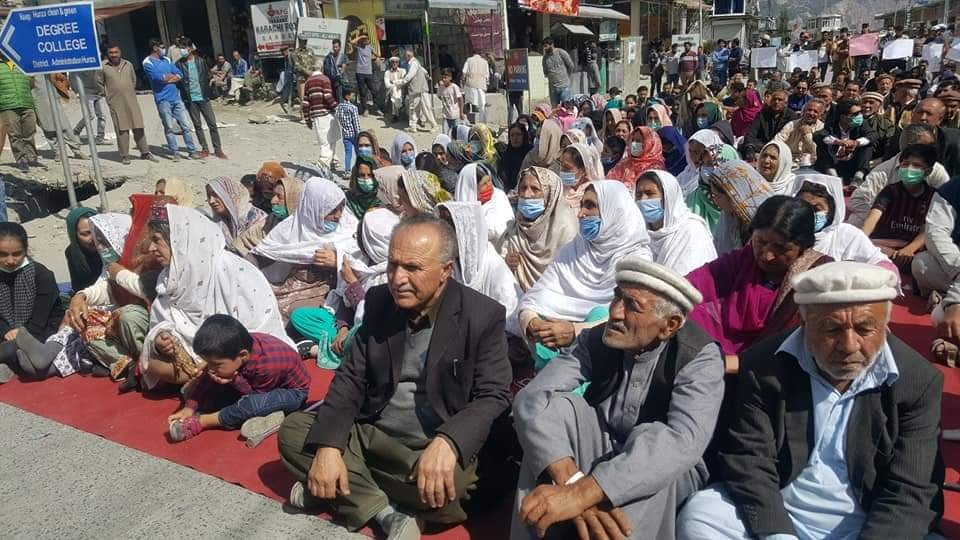Rizwan K. Qalandar

Hunza sit-in for the release of 14 political prisoners incarcerating for over nine years in Damas jail in Ghizer District enters its fourth day. The prisoners of Hunza were convicted by an Anti-Terrorism Court under fabricated charges of sedition and terrorism for destroying government buildings during a massive protest triggered by the shooting down of a man and his son while injuring several other disaster-hit people.
They were protesting the inordinate delay in payment of the relief amount promised by the Pakistan People’s Party government for the loss of their hearth and homes in the aftermath of the Atabad disaster. The then Chief Minister Mehdi Shah was visiting the area.
It must be noted that Baba Jan and his comrades have been actively advocating for the right to ownership of land, mineral and water resources by the people of GB with equal citizenship rights, way before the Atabad incident. He has been vocal on the issues of human rights violations across Pakistan as there is plenty of evidence on social media and YouTube regarding his activism and ideas.
The sit-in is primarily organised by the Aseeran-e-Hunza Rihayi Committee (free Hunza prisoners committee) comprised of family members of the prisoners as well as activists dedicated to highlighting the plight of the political prisoners and their families.
In an unprecedented move, the sit-in has blocked the Karakoram Highway (KKH) in Aliabad, the main commercial town of Hunza. KKH is the only land route that connects China with Pakistan. The much-touted CPEC is built on the same highway. Given the general elections in GB scheduled for November 15, the sit-in has attracted local politicians, and candidates to express solidarity with the protesters. Hundreds of people including women and children gather every day to brave the harsh cold weather and demand the release of the political prisoners.
It is unprecedented because Hunza is somewhat of a sociopolitical paradox within GB and Pakistan at large. Hunza on the one hand is presented as a modern-day paradise in beautiful mountains with an exceptionally high literacy rate in GB ranging over 90% in certain villages, community organization, women empowerment and peace.
Being opened up to the world earlier than many other parts of the region due to its location on the KKH complimented by the interventions by the Aga Khan Development Network in socio-economic development through community organization, health, education, women empowerment, conservation of historic sites, drinking water and tourism development projects. Given a majority of the Ismaili Muslims, these interventions became a success as the AKDN had community acceptance which came a little late in rest of the parts of GB. It is due to this developed image it is one of the highest visited tourist destinations in GB.
Hunza is, somehow, not very popular within GB for its commercialized hyped up image and depoliticised status due to dependency on NGOs with very little interaction with the state. It is felt that since the NGOs and their subsidiaries in the form of community-based organizations substitute for the government in service delivery, very little need is left to be dependent upon the state. It is felt that the generation that has grown under the shadows of the donor-funded development has become depoliticised and prefers to refrain from politics. This was somehow evident in the last tenure when the only seat in the legislative assembly was left vacant for three years due to dismissal of the sitting MLA and there was no representation for the constituency with no protest or demand by the local people and parties.
However, this sit-in for the release of the political prisoners portrays a completely different image of Hunza. Men and women of all ages led by the family members join the protest every day. There are children demanding the right to freedom for their loved ones. Women leading the protests are speaking loudly about the injustices done by the state. A new wave of political leadership in the making can be seen. Seasoned politicians, lawyers and activists have been explaining the social, political, legal and constitutional issues of the region. This is the much-needed civic education for the youth that will be participating in local politics.
We can’t be sure about the immediate outcomes of these protests as the sit-in enters its fourth day on Thursday but in the long run, it will have a tremendous impact on the political landscape of Hunza. This is evident from the support shown by left-leaning and nationalist parties across GB who have joined the protests directly or shown solidarity by protesting in their own constituencies. Demands are being made to release innocent political prisoners while boycotting the upcoming elections in GB is also under consideration.
It is high time for Islamabad to rethink its policy towards GB at large as the people are coming out of a slumber and are gradually gathering the courage to question the colonial misrule, becoming aware of their importance with respect to their relationship with Pakistan. This realization will lead to the dynamics of the relationship in contrast to the unconditional one-sided love affair that has led GB, in general, and Hunza, in particular, to this stage.
As the first step for the confidence-building measure, the government must start with the release of political prisoners, formulate policy and make constitutional amendments to provide equal citizenship rights, internal autonomy to the region, ensure ownership of the resources to the people, and give them access to justice in the country with or without provincial status.
Further negligence of this situation or even worse, knee-jerk reactions by the state and labelling people ‘traitors’ and ‘anti-state’ in a peripheralised region (for whatever reasons so far) for asking for their due rights would add to the frustration of youth, alienation and sense of deprivation of the people and may lead to protests, violence and political instability in the region.
The dreams of regional political stability and success of the CPEC cannot be fulfilled without a politically stable and content Gilgit-Baltistan to which Hunza is the gateway and first point of contact.

Rizwan K Qalandar is a graduate of University College London in planning with a background in governance and policy from Pakistan. He is a researcher by profession and is interested in politics of development, peripheralization and social movements.

The High Asia Herald is a member of High Asia Media Group — a window to High Asia and Central Asia

